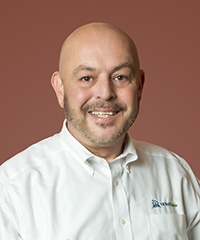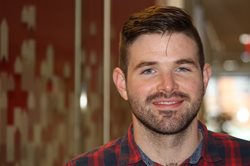Paul McLaughlin, Homeownership Program Director at NeighborWorks Southern New Hampshire, says NeighborWorks America's training on LGBTQ+ inclusion sparked ideas. Even after completing  the course, the ideas keep coming, from discussions about inclusive pronouns to contemplating a homebuyer education course with the LGBTQ+ population in mind. "Training like this should be for everybody," he says.
the course, the ideas keep coming, from discussions about inclusive pronouns to contemplating a homebuyer education course with the LGBTQ+ population in mind. "Training like this should be for everybody," he says.
In Oregon, NeighborWorks' training spurred an education instructor to add pronouns to his name when he teaches courses over Zoom. In Indiana, Brandi Burns, Intend Indianapolis' operations manager, says staff changed language from "husband or wife" to "spouse" on their emergency contact form after the course. She also updated her online profile to reflect her pronouns, "knowing that normalizing that is helpful."
Christi Baker, who has taught the inclusion course several times, says other students talked about revising intake forms with more inclusive wording. "It's important to really think about using inclusive, open language," she says.
McLaughlin says the course discussion was helpful, too. "It's important to be sensitive about who you're talking to. Often, you may not know who's in the room; that's even more of a reason to be sensitive."
He points out that the LGBTQ+ acronym ends with a plus. "You can be an ally," he says. "You can be the plus."
Creating a new course
NeighborWorks offered "Equal Access: LGBTQ+ Inclusion in Housing and Community Development Programs" last year for the first time. It came about because Cormac Molloy, senior manager, Curriculum & Training, noticed something missing from courses related to issues in housing and community development: There wasn't one focused specifically on LGBTQ+ concerns.
Other courses mentioned the topic, Molloy says. "But they didn't center queer people's experience. It's an important conversation." Molloy, who works on a number of courses involving REDI – Race, Equity, Diversity and Inclusion – became one of the architects of the course, which considers the lifecycle in housing and community development as it relates to LGBTQ+ people.
an important conversation." Molloy, who works on a number of courses involving REDI – Race, Equity, Diversity and Inclusion – became one of the architects of the course, which considers the lifecycle in housing and community development as it relates to LGBTQ+ people.
LGBTQ+ youth, especially youth of color, are at higher risk of homelessness, the training points out. According to the National Network for Youth, those who identify as lesbian, gay, bisexual, transgender or questioning have a 120% higher risk of experiencing homelessness in some form. Meanwhile, there's a homeownership gap for LGBTQ+ individuals among the nation's workforce. And older adults may more often face housing or financial insecurity or isolation.
There are other needs to be considered, too, Molloy adds. The LGBTQ+ community may have different health concerns, an important consideration for housing that includes wrap-around services. "Even the arts may look different." And it's important for housing practitioners to understand trauma the community may have faced, individually and historically. Understanding intersectionality with race and gender is also key, as is knowing what protections are available in different states – and what protections are not. And it's important to serve the community intentionally.
"A lot of great diversity, equity and inclusion work is being done, but to a large extent, the LGBTQ+ community is still not being lifted up as an audience to pay attention to," adds Baker. "How do we create cultural inclusion? We need to look at a range of ways to serve the community." She recommends housing developers get to know the needs in their local LGBTQ+ communities, particularly financial and housing needs.
Molloy plans to offer the course at the February 2023 Virtual Training Institute (VTI). Meanwhile, he's examining courses centered on transforming communities to make sure they include groups that are too often overlooked. "If we're truly intentional about applying a REDI lens, we need to embed that lens in all of the relevant courses," he says.
Don Trahan, Jr., NeighborWorks' senior director of REDI, agrees. "The network serves people of many diverse backgrounds and it's important that we're sensitive to that," he says. "At the same time, we want our housing practitioners to see their own lives and the lives of their communities reflected in our courses."
At NeighborWorks itself, plans to advance REDI work include training more facilitators, and focusing on work in areas such as the strategy and structure of REDI, communication, engagement, all-staff training and policy review. "We are committed to making NeighborWorks a great place to work for all staff, prioritizing advancing equity and inclusion, internally and externally."
Learn more about NeighorWorks America's training opportunities.
08/09/2022

